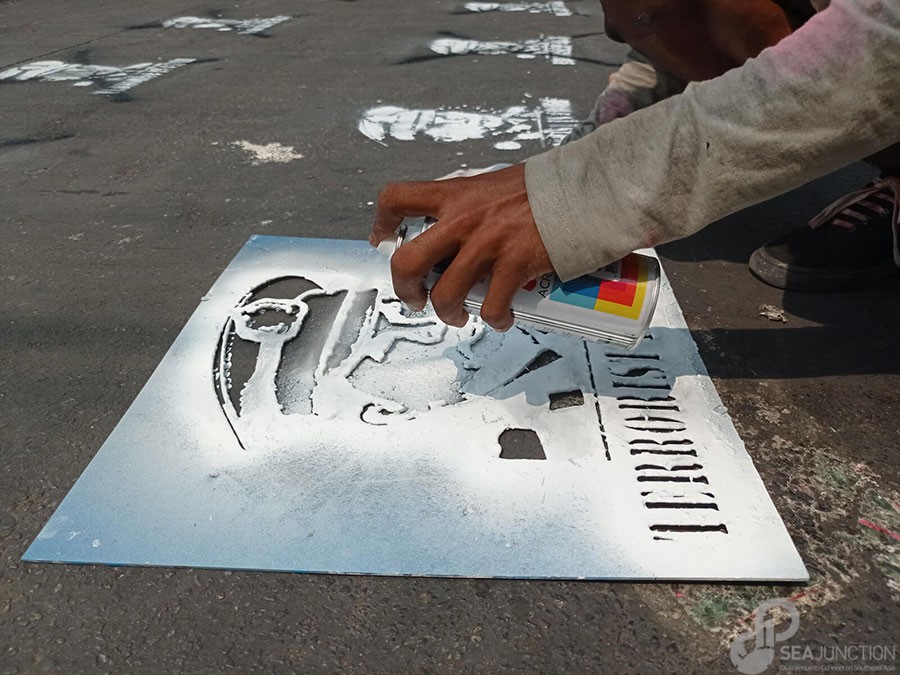
Photo Source: Visual Rebellion Myanmar (https://visualrebellion.org/photo)
Life Story for the Special Initiative “Living the Coup: Collective Diary of Daily Life in Myanmar” by SEA Junction and Partners.
| Title: | Junta’s Maximum Threat to All Aspects of Citizens’ Life in Myanmar |
| Storyteller: | Htet Aung (Pseudonym) |
| Date: | May 2021 |
As a citizen living in Yangon, I have watched the state-run MRTV every night since the coup on 1 February, not because I trust their news, but because I want to observe how much they lie. The more they lie, the better I can guess whether they are in crisis or not. I also listen to BBC, VOA, and RFA, the news agencies that most citizens in Myanmar have relied on since 1988 so that I can get the news that MRTV never covered and helps me to understand the real situation on the ground. Every day, the junta uses MRTV to threaten its own citizens by announcing the arrest warrants of those who took part in the protests, in the CDM (Civil Disobedience Movement) and those who support CRPH (Committee Representing Pyidaungsu Hluttaw) and NUG (National Unity Government).
In the first few days, the junta started announcing arrest warrants for medical doctors with their photos as criminals and threatened the private hospitals, clinics, and even free medical clinics to cancel their licenses if they accept these doctors in their facilities. Secondly, the junta did the same announcement for nurses. Thirdly, they announced the lists of teachers from basic education schools across the country. However, the junta took a different approach to the CDM teachers from the universities and technological schools. Unlike doctors, nurses, and basic education teachers, the junta only suspended hundreds of teachers from various universities and technological schools. It was obvious that the junta’s intimidating tactic is targeting the higher education teachers because they are difficult to be replaced.
A good thing that the people of Myanmar realized this series of intimidating announcements as important, accurate information on the numbers of CDM strikers from various government institutions. Previously, they did not have such information, though they knew a lot of civil servants are participating in the CDM. For instance, there are 339 CDM teachers from the University of Yangon and 249 CDM teachers from the University of Mandalay. Teacher names, positions, and department names were included in the lists. What’s breathtaking was that the list of one department included Department Head (Professor), Assoc. Professors, Lecturers, Assist. Lecturers, Tutors, Clerks, etc. It means almost the whole department took part in the CDM.
While threatening the CDM civil servants, the most headache issue the junta faced was that the citizens were withdrawing their money from the banks, but the latest intimidation made me shocked. One day morning in May, I was surprised to listen to a BBC interview with U Win Thaw, the junta-appointed Vice President of the Central Bank of Myanmar. In the interview, BBC asked him (1) how to address the problem of the citizens’ high demands on physical cash and low supplies from the state-owned and private banks and (2) how to address the issue of the bank account-to-cash trade market. Instead of answering the ways to address this issue, U Win Thaw threatened to arrest those who keep their own money in their homes, those who do not save it in the banks, and those who do the account-to-physical-cash trade. In fact, these people provided the services that the banks denied, exchanging their physical cash with a needy person who in return transfers his/her money to the trader’s bank account. The trader took 10 % for that service because of the supply and demand market theory. In other words, if you transfer 100,000 Kyat to the trader’s bank account, he/ she will give you physical cash of 90,000 Kyat. In addition, he accused even the citizens as attacking the government for withdrawing money from the banks. It is the responsibility of the government (If they assume themselves as government) and the banks to issue enough physical cash to the citizens who need it so that the new cash trade market will be stopped.
The junta is capable of only one thing: Threatening and arresting.
Organizers
“Living the Coup: Collective Diary of Daily Life in Myanmar” is a special initiative of SEA Junction in collaboration with Asia Justice Rights (AJAR) to document how people are living in present-day Myanmar and their coping with daily security, economic and health challenges. We are asking for short stories in the form of written, photo essays or art illustration, in Burmese Language (to be later translated into English) or in English. For more background and other stories click here.
SEA Junction
SEA Junction, established under the Thai non-profit organization Foundation for Southeast Asia Studies (ForSEA), aims to foster understanding and appreciation of Southeast Asia in all its socio-cultural dimensions- from arts and lifestyles to economy and development. Conveniently located at Room 408 of the Bangkok Arts and Culture Center or BACC (across MBK, BTS National Stadium), SEA Junction facilitates public access to knowledge resources and exchanges among students, practitioners and Southeast Asia lovers. For more information see www.seajunction.org, join the Facebook group: http://www.facebook.com/groups/1693058870976440/ and follow us on twitter and Instagram @seajunction
Asia Justice and Rights (AJAR)
AJAR is a non-profit organization, based in Jakarta, Indonesia, whose aim is to contribute to the strengthening of human rights and the alleviation of entrenched impunity in the Asia-Pacific region. Its work focuses on countries involved in transition from a context of mass human rights violations to democracy, where it strives to build cultures based on accountability, justice and a willingness to learn from the root causes of human rights violations to help prevent the recurrence of state-sanctioned human rights violations. For more information, see https://asia-ajar.org.


